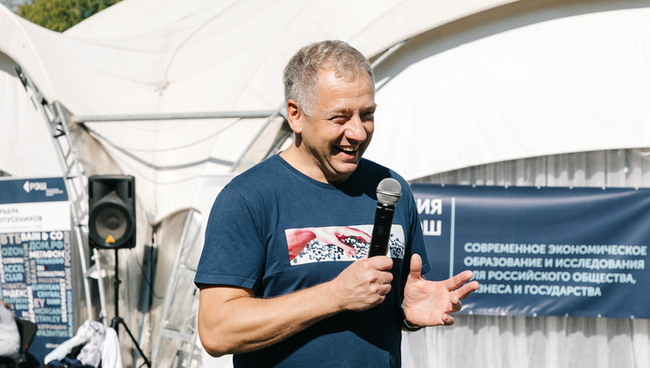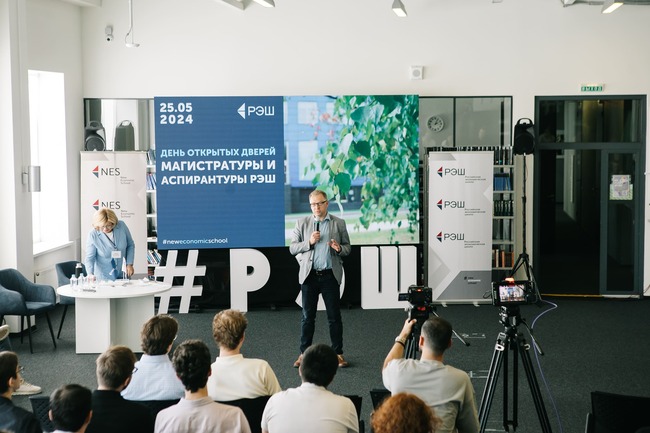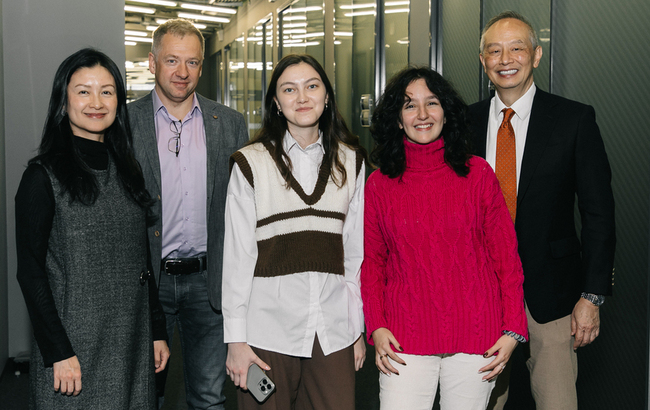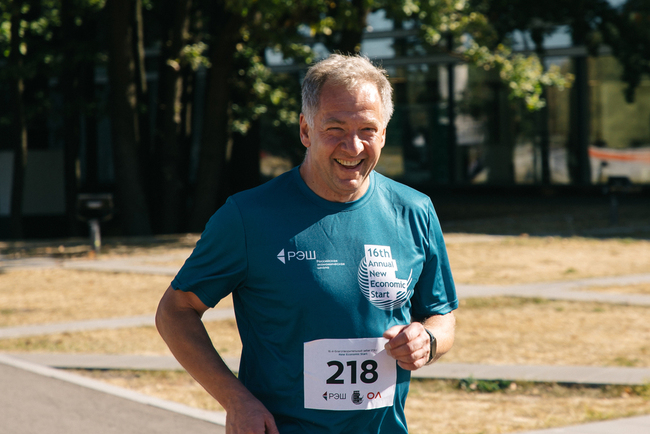— In your public speeches, you often say that NES is primarily about people: a strong community of students, alumni, professors, and staff. Let’s start with the new NES members then. How many students have joined NES this year? Can you provide the 2024 admission data?
This has been a very successful year for us, with inspiring results of the admissions campaign. The largest growth is in our undergraduate program, where we exceeded 100 first-year students for the first time in NES history, with 114 students enrolled this year. Our master’s programs also saw a strong intake. Importantly, the success of the admissions campaign is not because we lowered our standards; rather, we attracted truly exceptional students. I consider this a great success, and I want to thank the entire school team that worked together to achieve this result. I’d also like to highlight the PhD program: since September 2023, NES has its own PhD program in Economic Theory, where we doubled the intake with six new students, five of whom have been enrolled in the program and started their studies.

NES Welcome Day, September 2024
— Where do most PhD students come from? In the first cohort, all three were graduates of the "Master of Arts in Economics" program. What about this year?
Three of them — Grigory Korolev (MAE’2024), Daniil Spiridonov (MAE’2024), and Alexander Vlasov (BAE’2021, MAE’2024) — are this year’s graduates of our master’s program. Alexander Vlasov also completed our undergraduate program before that. Larisa Korableva (MAE’2008) is another NES alumna who graduated in 2008, taught at NES and Moscow State University, and has now decided to pursue a PhD at NES. Arina Rodina, who studied at HSE and worked at CEFIR on various projects last year, will be my supervisee. We aim for PhD students to know from the start who they will work with on their research. A PhD program lasts only three years, so there’s a lot to accomplish, including meeting formal publication requirements: they must complete their research, and have it published in one of the leading academic journals. We are all focused on serious work from the start.
— Are you satisfied with the PhD program’s growth and the increasing interest from candidates? Were there many applications?
We never planned to have a very large PhD program. We initially aimed to admit 5-7 students per year, so having five new, strong, motivated students is an excellent result that meets our high expectations. Running a PhD program is resource-intensive because it requires a lot of attention from professors. Also, NES is a research university, we ensure our faculty have limited teaching loads so they can focus on their research. Therefore, even if we wanted to, we couldn't expand the program significantly. Faculty members with new PhD students, besides myself, include Hosny Zoabi, Sergey Kovbasyuk, Sultan Mehmood, Konstantin Styrin, Valery Charnavoky, and Ozgur Evren. Still, the project may grow over time.
— If there are no plans for rapid expansion, why does the PhD program have two directors: professors Ozgur Evren and Dmitry Dagaev?
Initially, Ozgur Evren was the director. Ozgur knows well how international PhD programs are structured. At the same time, it’s important that our PhD graduates can defend dissertations and receive degrees recognized within the Russian education system. We hope that PhD graduates will become future professors at Russian universities as well. So, we needed to combine the best global PhD practices with Russian standards and regulatory requirements. Dmitry Dagaev, with his significant administrative experience, having served as Vice-Rector for Research at HSE, strengthens the PhD program strategically. I will emphasize once again: that it is a very important project for NES, and we are very pleased with how it is progressing.

NES Master's and PhD Programs Open Day, May 2024
— Let’s get back to the topic of faculty. Despite everything, NES remains part of the international academic community, are we still hiring professors from the global job market? What’s the current situation, and are there any updates? In general, how do you estimate the interest in NES from the international academic community?
Interest remains high. This year, we received over 40 applications, followed by interviews with selected candidates. Ultimately, we invited 13 candidates to deliver a seminar (the “fly-out” stage). Before COVID-19, candidates would fly to the university for face-to-face meetings. Now, fly-outs are usually virtual, at the meetings we form our opinion about candidates, and the candidates understand what NES is like. We had candidates from various countries, including China, Korea, and Colombia. We successfully hired three professors. One of them is Kiryl Khalmetski (PhD, Frankfurt University, 2014), who has been teaching experimental economics at NES for several years. We are thrilled he decided to join NES full-time. Kirill has strong publications and has taught in the UK at the University of Bath, where he read courses on programming and computational methods for economists, economic design, and others. Aleksey Kolokolov (PhD, University of Rome Tor Vergata, 2013) is also an experienced professor with excellent publications. He has worked at the Alliance MBS at the University of Manchester. Both of them have highly in-demand specializations. Kiryl's focus is behavioral economics, and Aleksey is specialized in financial econometrics. The third professor is Timur Sobolev (PhD, Stanford Graduate School of Business, 2024), who has just graduated from Stanford Business School. His area of interest is also very relevant — corporate governance, ESG, and corporate finance.

NES Research Conference, December 2023
— For more than two and a half years, we've been living in a world where geopolitics plays one of the key roles. How has this situation affected NES? What are the main challenges, or has adaptation already occurred?
Our professors continue to publish articles in leading academic journals. They are also actively involved in the international academic community, attending conferences and giving presentations at seminars. The main challenges are logistical—trips that used to take 3-4 hours now take half a day, and everything has become more expensive. There have been few incidents where our professors were denied participation in seminars at the last minute simply because they represented a Russian university. This is a sad situation, but I emphasize that it is more of an exception. It has also become more difficult to arrange internships at foreign universities for our students. However, we have an advantage here: we have long-established partnerships with various universities, including Chinese ones. This direction is now developing even more actively. This year, for the second time, NES students participated in the Summer School on China's Economics and Sustainable Development, organized by one of NES's partner universities, the Research Institute of Economics and Management of the Southwestern University of Finance and Economics (SWUFE RIEM). More than 20 students from various NES programs spent two weeks in China, from July 7 to 21. We also have an excellent relationship with a Mexican university, where many of our undergraduate students traditionally go for internships. Despite the challenges, three of our students managed to spend a semester last academic year at Bocconi University (Italy). We strive to ensure that the international exchange process continues for both students and professors. At the beginning of this academic year, leading economists from the Pakistan Institute of Development Economics visited us with lectures. In October, a delegation from Hong Kong visited NES. We regularly hold research seminars with professors from various universities.

Visit of a delegation from Hong Kong, October 2024
— NES is a non-governmental institution, and its financial situation and budget directly depend on the support of partners and alumni. How has the situation changed in recent years?
The mission of NES is to provide excellent education and conduct high-level research, including fundamental research. In both education and research, we maintain compliance with the best international standards. A university of this level is an expensive project. Therefore, we are immensely grateful to all our donors, partners, and friends who continue to support NES, helping this truly unique and successful story not only survive but also thrive. Among the largest donors for the 2023/2024 academic year are Russian Railways, Sber, oil and gas exploration company RNG, Moscow Exchange Group (MOEX), Norilsk Nickel, a new partner Credit Bank of Moscow, SAFMAR Charitable Foundation, and Domodedovo International Airport. There are different types of support—statutory, when a donor supports the entire school, or targeted, such as student grants, specific professor positions, popular science projects, or campus development. For example, Alber Blanc decided to directly support our students who went to study for a semester at Bocconi University and the ISEO Summer School, where lectures are given by Nobel laureates. We are glad that we now have a campus. Over the past three years, we have truly settled in, and we are happy to see students here. We strive to improve classrooms, open new student lounges, and create spaces for work and relaxation. We now have excellent offices for PhD students. We hope they will spend more time together, engaging in discussions — communication and knowledge exchange are vital in academia. We are also pleased that NES alumni understand the importance of supporting the School and contributing to both statutory and targeted aid. For example, some classrooms and the gym were renovated with alumni donations, which is very important. Alumni also support scholarship programs, subscriptions to necessary academic publications and programs, and educational case studies.
— Let's talk about the educational programs now. One of the global trends today is data analysis, machine learning, and artificial intelligence. NES was ahead of the curve here. After all, data analysis is the core of economics. What data analysis courses are currently offered at NES, and will there be new ones?
Data analysis is indeed a highly sought-after field. Elements of data analysis, especially traditional econometrics, have always been part of the core curriculum of any NES program. In addition, we offer a wide range of elective courses, including newer but very popular areas like machine learning and the application of AI. It’s essential to emphasize NES’s distinctive approach to data analysis programs. We focus primarily on the essence of a phenomenon or problem. Data analysis is a tool, albeit one of the most advanced and widely used today, but still a tool. When updating programs — whether it's the “Master of Arts in Finance" program or the specialized "Economics and Data Science" program — our priority is a fundamental understanding of economic processes, the functioning of financial markets, the incentives for participants, and how different players interact. This is NES’s trademark: we teach students to understand the essence first, using data analysis as one of the tools. Data analysis in its pure form is a more algorithmic process, and the rapidly advancing AI is primarily going to replace methodological processes, not humans themselves, nor analysts or researchers. Understanding the deeper connections between different phenomena, the so-called economic intuition is something even the most advanced AI likely won’t master tomorrow — it might happen the day after tomorrow. However, everything related to AI is, without a doubt, in our focus.

NES Alumni Reunion, December 2023
— You often interact with corporations and companies, including as employers. How are their expectations changing, and what are the main requirements for young employees?
NES graduates remain among the most sought-after, with traditionally over two-thirds of graduates employed by the time they receive their diploma. Some of the graduates continue their studies. The percentage of undecided graduates is always minimal. Our graduates, even in entry-level positions, typically earn higher-than-average salaries. Why does this happen? We like the educational model we have developed. Nowadays, there is sometimes criticism of the split between undergraduate and master’s programs. I can’t speak for all Russian undergraduate programs, but I can speak for ours. In the four years of the Joint Bachelor Program with HSE, we manage to train genuinely strong specialists who are very successful in the labor market, earn excellent salaries, find interesting jobs, and quickly develop their careers. We have high standards for all students, whether undergraduates or master’s students. The Bachelor’s program is an intensive, high-quality program with diverse courses and various paths for graduates to choose from. Where do our graduates mainly go? Most go into finance, IT, and e-commerce, including Russian banks and large companies, especially tech companies, international businesses, and startups. Some students go directly into top PhD programs after their bachelor's, and even more do so after their master’s.
In today’s world, it’s impossible to learn everything in 4, 5, or 6 years, earn a degree, and then just work and forget about studying. I believe a more reasonable model now is one where people continue learning throughout their lives and careers. NES has always embraced the principle of lifelong learning. We offer a range of fundamental educational programs — from undergraduate to PhD levels — but we also place great importance on the educational opportunities we provide to more mature individuals. In this regard, I’d like to highlight our evening "Master in Finance" program, which is in high demand. Professionals come to us who have already achieved something in their careers and want to give it a new impetus. The average age of a MiF student is 30. People come to us not only for cutting-edge knowledge and tools, like data analysis but also for networking, new acquaintances, and the advantages offered by NES’s strong and vibrant community. Lifelong learning can take different forms, such as enrolling in individual courses.
I would also like to mention our corporate programs. The Business Academy of NES is actively working and attracting new partners. The Wealth Management Programs are particularly popular. Among the current projects, there are many interesting and diverse areas, for example, right now we are teaching finance to engineers from technology companies. Why? So that they can speak the same language as the financiers of these companies and find more effective solutions for the business. There are many such projects, and we will try to talk about them more often. The opportunity for a wide choice, career trajectory changes at any stage, and demand in the job market are the advantages that, in addition to an excellent foundation and a cool community, every NES graduate receives.
— What makes the NES community so unique and stand out among other universities?
It’s hard for me to speak for all members of the community, but for me, NES, when I studied here, was a very bright and positive experience. I met many amazing people who taught me a lot and instilled a love for serious work. On the other hand, when I entered NES after studying at MSU, I had a culture shock. Due to NES’s relatively small size, it manages to create a chamber atmosphere, where the distance between students, the administration, and professors is much smaller than at larger universities. This atmosphere is very appealing; you fall in love with it and later expect the same warmth, attention, friendliness, and genuine interest in you as a person and professional wherever you go. At NES, we usually address professors by their first names, not using their patronymics, which is not very common in Russian universities. But that’s just the tip of the iceberg. The main thing is how communication and work are structured; each professor can dedicate enough time to every student. Plus, over 30 years, the School has developed its traditions, such as our annual Charity Run, chess and basketball tournaments, and community meetings.

NES annual run New Economic Start, September 2024
— The NES Spring Ball...
Yes, and the Spring Ball, which shows that economists and financiers are not only about formulas and data analysis but also about the hustle and Argentine tango. We meet monthly with the NES Alumni Council to discuss internal processes, achievements, and challenges. Alumni genuinely try to help in every possible way, from financial support to participation in educational, and cultural initiatives, and other projects. Many alumni are also on the Board of Directors and among the professors. This trend and continuity make me very happy as both an alumnus and a rector.
Despite the diversity of people at NES, the core of NES’s DNA is curiosity, openness, and the pursuit of truth. These are the values that unite most NES people.
— Let’s move on to NES’s popular science projects, which are gaining more popularity. The podcast "Economics Out Loud" has more than 2.5 million listens, and the NES lecture series has transformed into a new format, "Popular Science Days" in memory of NES co-founder Gur Ofer, with participation from professors, alumni, and representatives of business, and academia. Why is it important for NES to develop its popular science projects?
The goal is simple: to help all curious and thoughtful people, regardless of age or profession, gain access to the latest scientific knowledge. It is important for us that this knowledge is not presented in a complicated or overly academic manner, but is shared in an interesting and accessible way. Economics and finance objectively play a large role in everyone’s life, and now many people are realizing this. The nature of economic interactions sparks genuine interest, which is why the materials on the GURU popular science website and the NES podcast are so popular. It’s great that our projects are not limited strictly to economics. We cover topics like economics and cinema (watch the discussion, listen to the podcast in Russian), or economics and literature (listen to the podcast in Russian: Part 1 and Part 2), which provide deep insights into the connection between economics and everyday life.
— The NES website and GURU feature reviews of the most notable and relevant economic research. As a scholar, which of your colleagues do you follow? Which research areas do you find interesting?
I try to follow everything related to behavioral economics, which is my area of expertise. Within this field, I’m interested in a variety of topics, such as systematic cognitive biases, like overconfidence, which is common among many people. I’m also interested in the macroeconomic applications of behavioral economics, based on the fact that people’s attention is limited, which significantly affects how they perceive economic reality and make decisions. One of the behavioral economics articles that caught my attention is "Misperceptions About Others." I always closely follow what my mentor, Jean Tirole, is doing (watch Jean Tirole’s lecture at NES). He has an incredibly broad range of interests. Recently, for example, he has been paying a lot of attention to climate change and what people can do collectively to counteract it (article "The Portfolio of Economic Policies Needed to Fight Climate Change"). I think this is a very important topic, although its relevance may not yet be fully recognized by everyone (another article, for example, "Fighting Climate Change: International Attitudes Toward Climate Policies"). At NES, Professor Gerhard Toews deals with applied topics related to environmental economics and climate change, while ESG is covered by Professor Maxim Bouev, Vice-Rector for Development. On GURU, we often publish materials on climate topics ('How Climate Has Influenced and Continues to Influence the Economy,' 'Banks Are Not Concerned About Global Warming,' and others).
— What reading would you recommend to prospective students or those who are not yet familiar with economics?
When it comes to economics, I would confidently recommend a wonderful book by psychologist Steven Pinker called 'Rationality.' Although Pinker is not an economist, it is clear that he understands economics and game theory very well, along with many other social sciences, which is why he writes brightly, interestingly, and convincingly, always referencing serious scientific research. It’s also worth paying attention to other books by Pinker, such as 'Enlightenment Now.' I can also recommend the book 'Grit' by Angela Duckworth. Again, strictly speaking, this book was written by a psychologist, but the topic is closely related to behavioral economics. For developing economic intuition, I would suggest Steven Landsburg’s already classic book 'The Armchair Economist.' And, of course, I’d recommend interesting and important books by this year’s Nobel laureates, Daron Acemoglu, Simon Johnson, and James Robinson.
— What would you wish for yourself and the entire NES team for this new academic year?
NES is still a research university, so I wish for myself, my colleagues, and our students to engage in interesting, successful, and, ideally, life-enhancing research projects and scientific achievements. I hope we continue to build on the great success and human capital that we’ve accumulated over 30-plus years of our history. I hope we keep doing what we’ve always done—teaching economics and finance—but with our interests not limited to just these fields. In a world where interdisciplinarity is becoming the norm, NES will also develop other areas, all while maintaining the quality of its students and faculty. And we mustn’t lose the atmosphere of mutual trust, sympathy, and empathy, which exists in the School and is one of our most important values. We’ve started developing a new strategy for NES for the next five years. We clearly understand that our task is not only to preserve everything the School has already achieved but also to grow and move forward. We are currently working on several concrete directions, which we are discussing and will present to the Board of Directors closer to the end of the year. I look forward to meeting again to share the results of this work.

